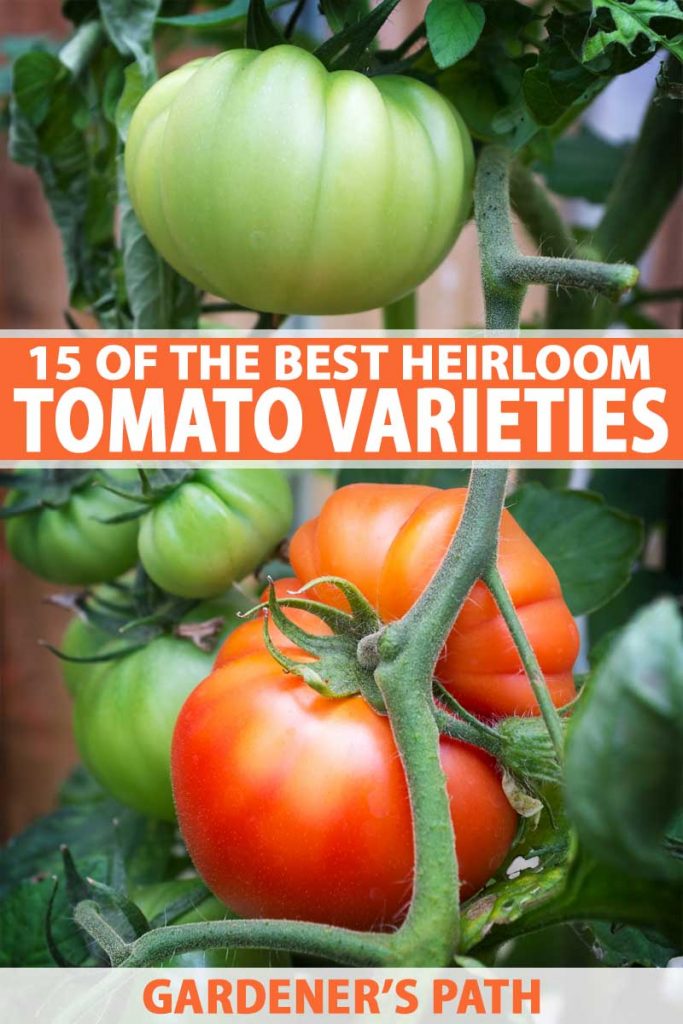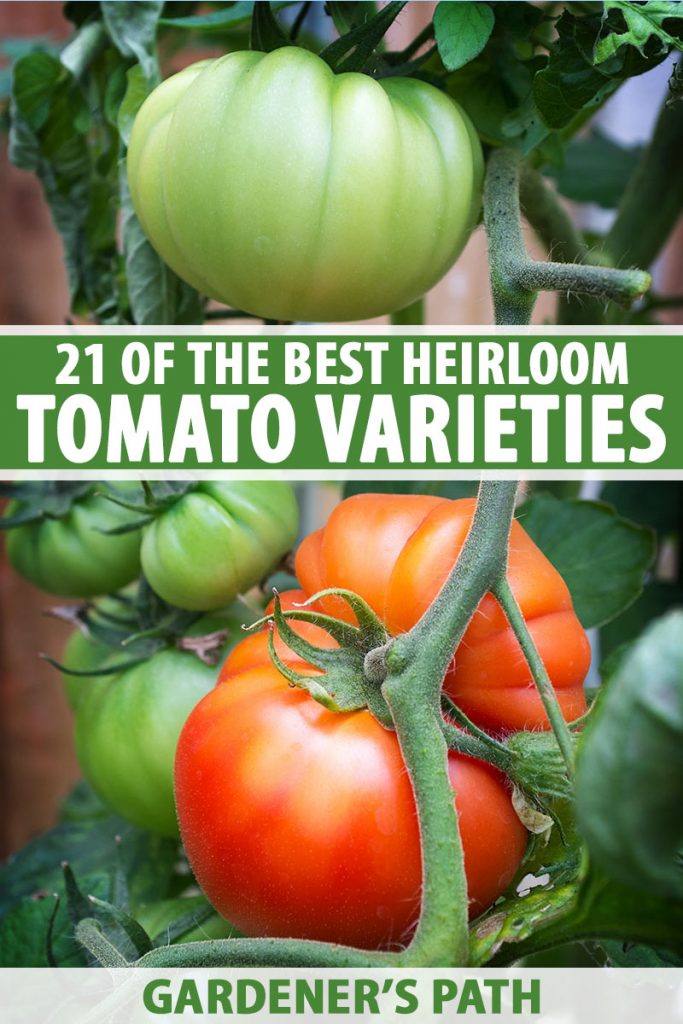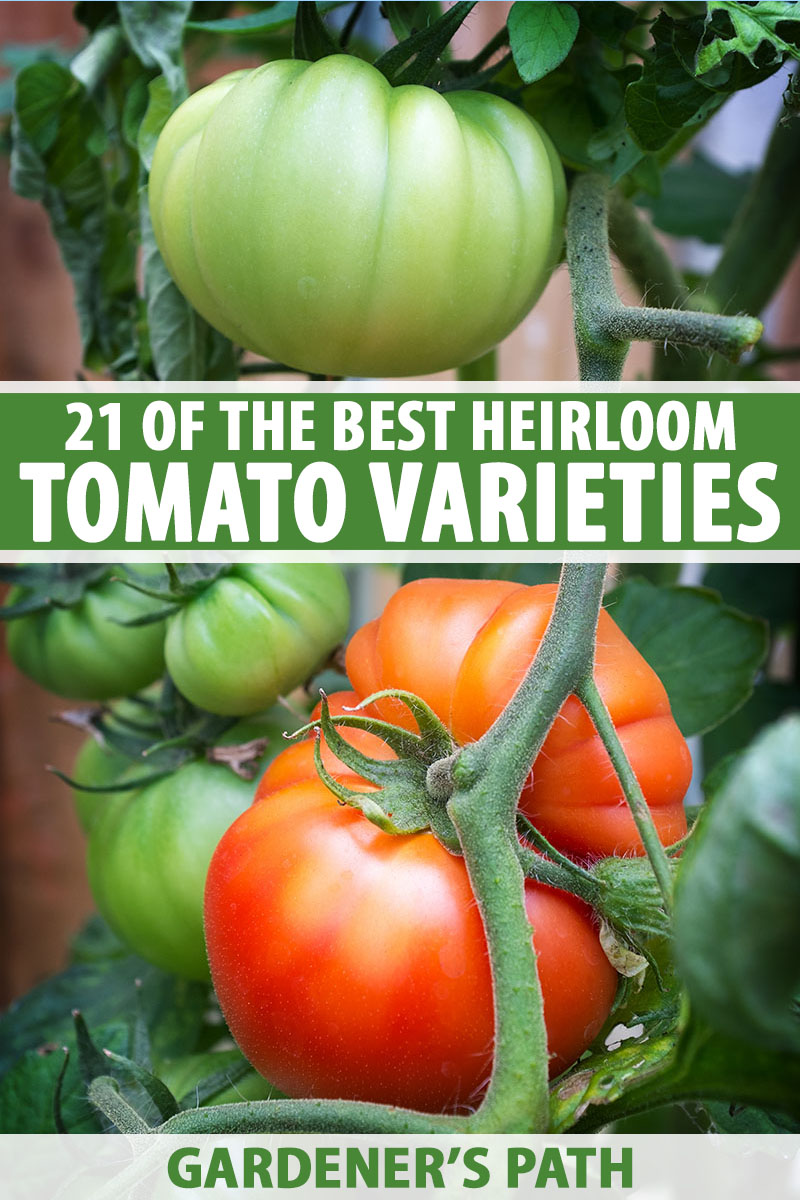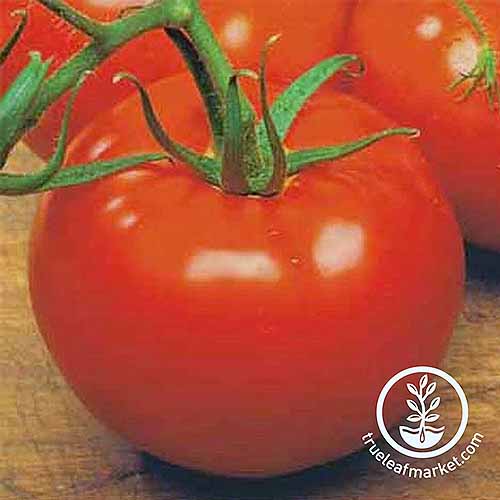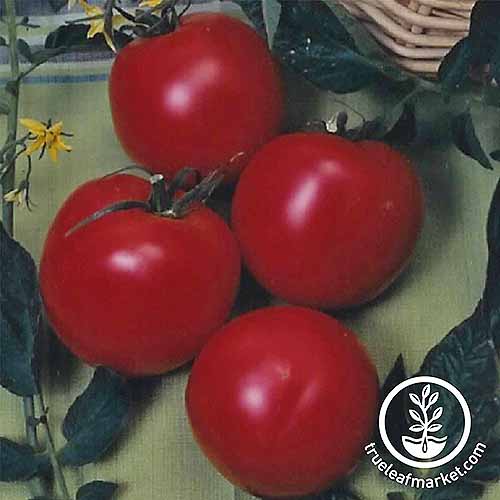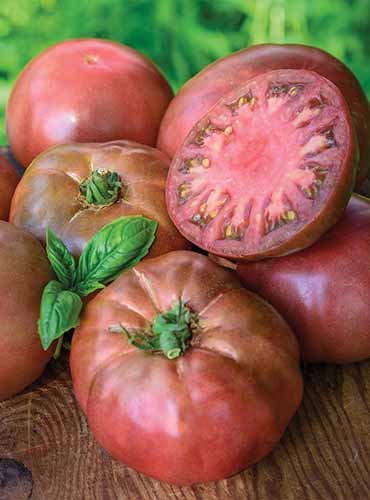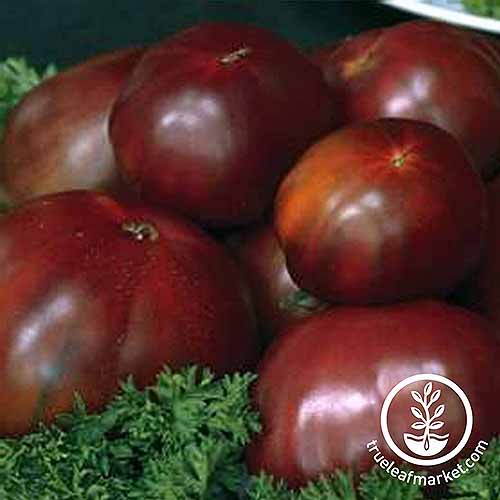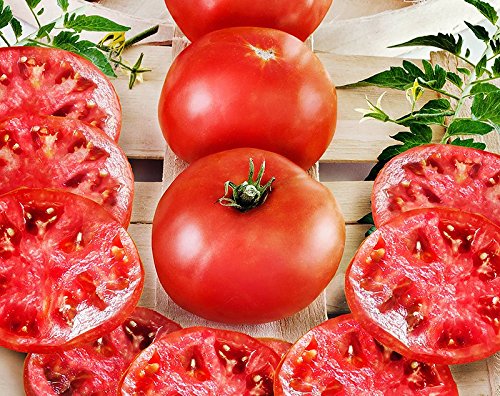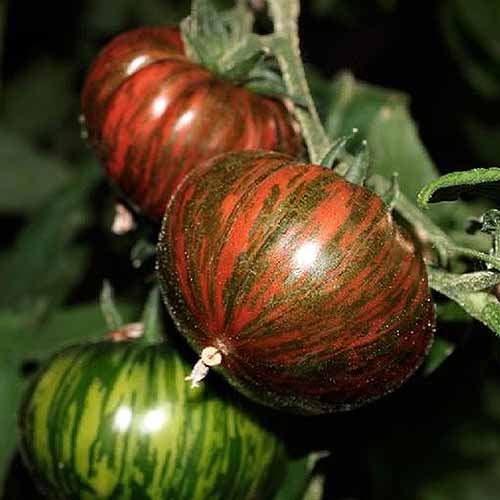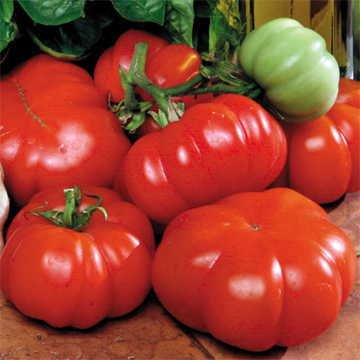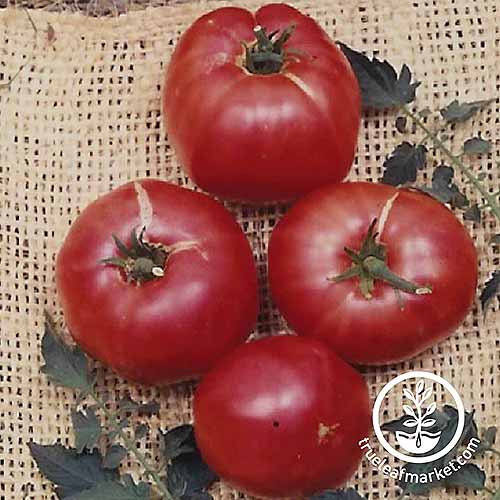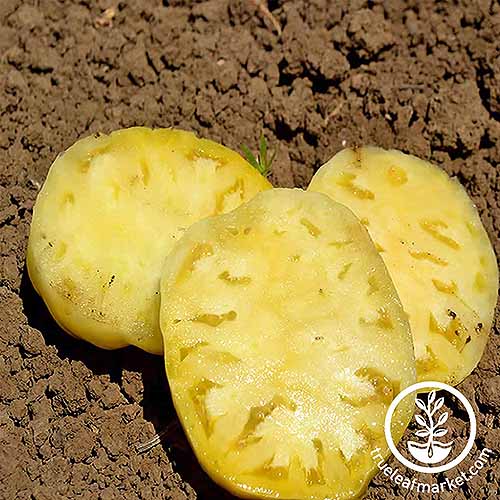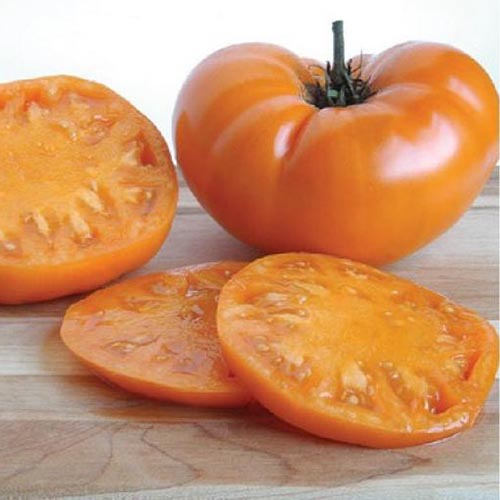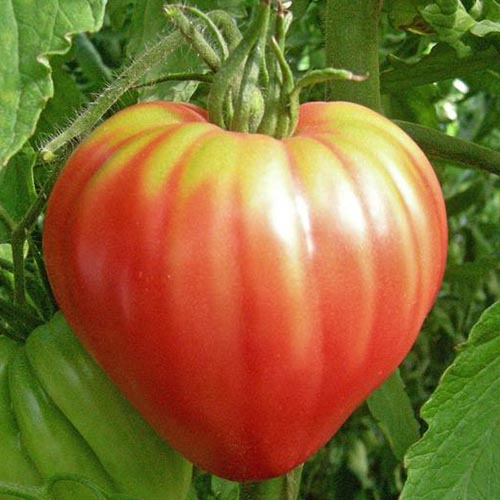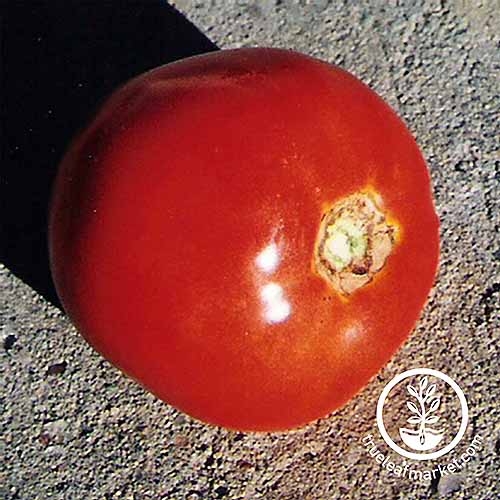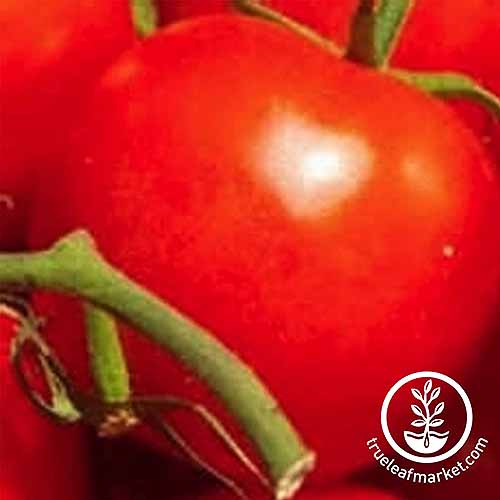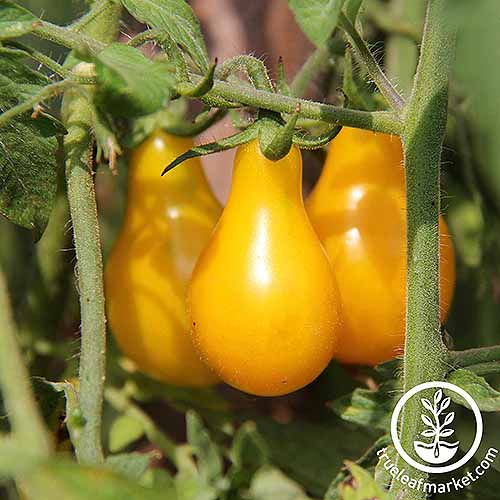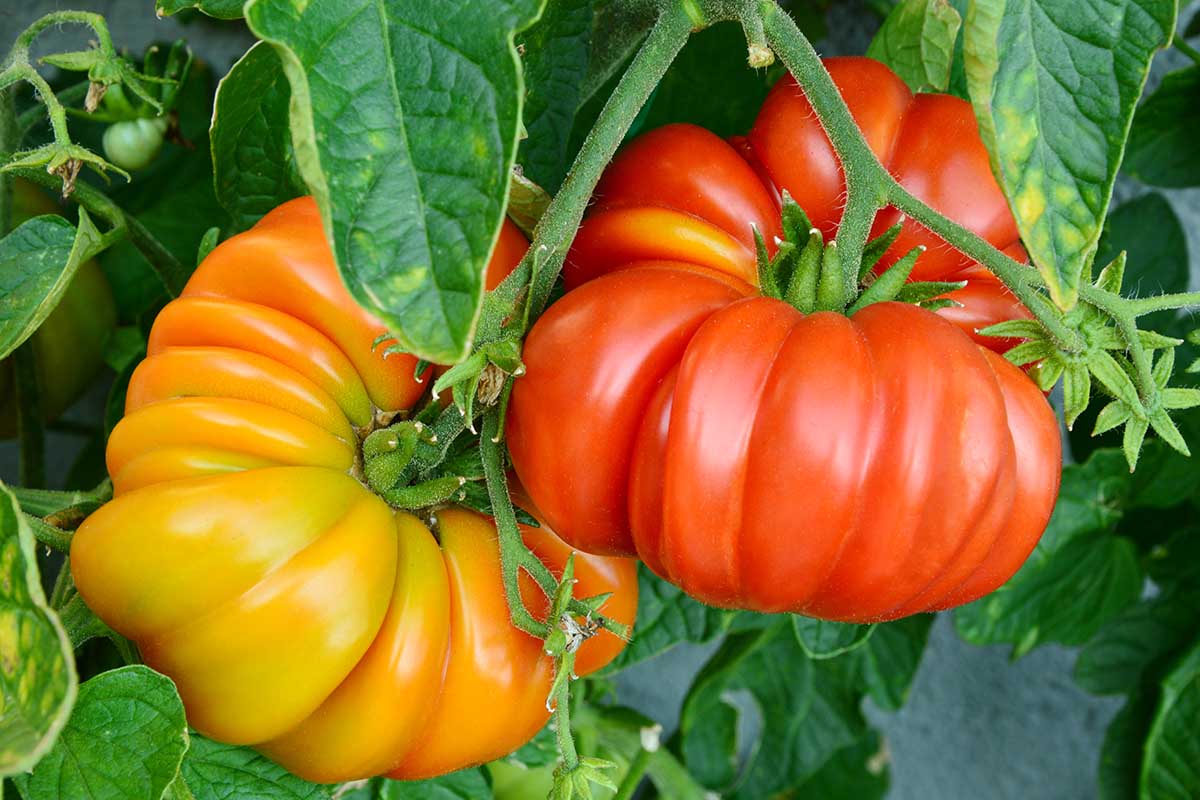Then planting heirloom varieties is the way to go. These are plants that hark back to the days when food crops were about nutrition and flavor, not rushing an unripe, tasteless, and vitamin-deficient crop to market. Stop subjecting your family to the ordinary, pale-fleshed, flavorless fruits that dominate grocery store shelves, or paying premium prices to experiment with gourmet varieties. We link to vendors to help you find relevant products. If you buy from one of our links, we may earn a commission. Heirloom plants are treasures that have been grown for generations from seeds gathered year after year, to preserve their exceptional flavor – as opposed to commercial crops that are prized for their durability, often at the expense of taste and nutrition. Heirlooms differ from another type of tomato plant, the hybrid. Hybrids are a combination of two cultivars that have been deliberately cross-pollinated for purposes such as disease resistance, increased yield, or uniform shape. They don’t come in the same array of colors and shapes as heirlooms, but there are varieties available that are superior to store-bought produce. Whether their flavors rival those of heirlooms is open to debate. In general, growing your own fruits and vegetables results in healthier produce. According to experts at the Center for Health and the Global Environment at the Harvard T. H. Chan School of Public Health, produce that is allowed to ripen on the vine contains the most vitamins, nutrients, and phytochemicals to support good health. When commercially grown tomatoes are picked green for transport, their vitamin C content is decreased. Although they continue to ripen, turning red in the process, they may never achieve their full complement of nutrients. In addition, even minimal commercial processing affects the overall nutritional value of fruits and vegetables, and mishandling that produces bruising may also reduce nutritive content. With what we know today about the value of eating a variety of brightly colored fruits and vegetables, I find that serving colorful and tasty heirloom produce is a wonderful way to nourish my family. Tomato plants grow in one of two ways: determinate or indeterminate. Heirloom seeds may or may not be so certified, and selection is a matter of preference.
Determinate plants grow into a compact bush shape, and produce all of their fruit over a couple of weeks.Indeterminate plants continue to grow and produce fruit for the duration of the growing season, often until a frost.
Read more about the differences between determinate and indeterminate tomato varieties. Now, let’s check out some of our favorites. Named for a creek not far from here, this tasty variety was saved from extinction by an old gentleman who supplied the Seed Savers Exchange with seeds that he had gotten from a fellow gardener, whose family had been cultivating the variety for almost a century. That’s heirloom vegetable gardening at its best – good people growing good crops.
1. Ace 55-VF
A vigorous determinate bush variety, this plant matures in about 80 to 85 days. First introduced in 1964 by the Asgrow Seed company, plants may not require staking, and have excellent disease resistance. The VF means this cultivar is resistant to Verticillium and Fusarium wilt. ‘Ace 55-VF’ Seeds ‘Ace 55’ is a thick-walled red variety on the order of a beefsteak, with a sweet flavor and low acid content, making it great for eating fresh or preparing in cooked dishes. Due to its low acid content, this variety is not suitable for canning. Seeds are available from True Leaf Market.
2. Amish Paste
There’s no better plum variety for sauces and canning than this meaty red one, and we have the Amish of Wisconsin to thank for it. ‘Amish Paste’ Seeds Dating from the late 1800s, this indeterminate variety matures in about 80 days, producing six- to eight-ounce juicy fruits. Support with a trellis as needed, and enjoy its fruit all season long. Packets of 25 seeds are available from Burpee.
3. Arkansas Traveler
Mild-tasting, this indeterminate type has a pinkish hue, crack-resistant skin, tolerance for heat and humidity, and overall disease resistance. The six- to eight-ounce round fruits are delicious straight from the garden and sliced onto a plate. This variety originated in the Ozark mountains in the late 1800s. ‘Arkansas Traveler’ Seeds Fruits mature in approximately 80 days, and support with a trellis or stakes may be required. You’ll find seeds in a variety of packet sizes at True Leaf Market.
4. Black Cherry
For snacking on the go, ‘Black Cherry’ delivers. It offers the rich sweetness and depth of flavor you love in full-size black varieties, but this time, that deliciousness comes in a bite-sized package. One- to one-and-one-half-inch fruits grow on rambling five-foot-long indeterminate vines that crave full sunshine. ‘Black Cherry’ Expect maturity in 65 to 75 days. Provide structural support as needed. Find packets of 30 seeds available from Burpee.
5. Black Krim
If robust flavor and nutrition are what you’re looking for, this one’s for you. Also known as ‘Black Crimea,’ this variety was first introduced in 1990 by the Seed Savers Exchange. ‘Black Krim’ Of Russian origin, the color of this indeterminate beefsteak-style cultivar is a blend of purple, red, and brown hues. Fruits can weigh up to 12 ounces. Supply climbing support for this hearty, disease-resistant variety, and enjoy a continuous supply of vegetables from its 80-day maturity until the first frost. You can find live plants and packets of 30 or 100 seeds available from Burpee.
6. Black Russian
A bushy, indeterminate plant, ‘Black Russian’ may be grown as a container plant when maintained with careful pruning. ‘Black Russian’ Seeds Four-ounce fruits have reddish-brown skin, meaty flesh, and a unique flavor often described as smoky. Not too acidic, nor too sweet, it strikes a tasty balance as a stand-alone or salad feature. Allow 80 to 85 days for maturity, and eat fresh, as it doesn’t store well. You’ll find seeds for this variety available at True Leaf Market.
7. Bonny Best
This meaty fruit is a canning favorite with a classic balance of sweet and tart. Bright red fruits grow to a mature size of between two and 10 ounces. ‘Bonny Best’ was listed in Vaughan’s Seed Store catalog in 1897, and by 1910 it had gained popularity among gardeners. ‘Bonny Best’ Seeds An indeterminate grower, it matures in about 75 to 80 days. Provide structural support and enjoy a bountiful harvest.
7. Brandywine
This is a great slicing variety. Available in shades of pink, red, black, and yellow, this beefsteak type is creamy in texture, low in acidity, and high in flavor. Fruits can weigh up to two pounds. ‘Brandywine Yellow’ Seeds It has a characteristic “potato” leaf that is smooth-edged, rather than the usual serrated foliage. Maturity varies by type from 70 to 100 days. You’ll find seeds for the red and yellow variety at Eden Brothers. If you prefer pink, Eden Brothers has got you covered as well. Learn more about growing Brandywine here.
9. Cherokee Purple
We have the Cherokees to thank for cultivating this beauty over the course of the past century. It’s a dynamic bush-style plant with indeterminate fruit production that matures in about 80 days. ‘Cherokee Purple’ Seeds Resistant to disease, it may withstand a dry spell, and benefits from caging or staking. Large, 12- to 16-ounce sweet fruit is an attractive pinkish-purple, and it makes a vivid addition to any meal. You can find live plants and packets of 30 or 100 seeds available from Burpee and we have more information about growing them in our detailed guide.
10. Chocolate Stripes
A top-notch slicing tomato for salads and sandwiches, this indeterminate type has a complex, earthy flavor. ‘Chocolate Stripes’ Seeds Reddish-brown fruits boast contrasting light and dark green stripes and reddish-brown flesh. They are a generous four to six inches in diameter, and can weigh up to one pound. Plants mature in approximately 80 days. Find seeds in a variety of packet sizes available at Eden Brothers.
11. Constoluto Genovese
Right out of Nonna’s 19th-century kitchen, this is an Italian classic. Sauced, preserved, and eaten out of hand for generations, it’s still a staple today among cooks who demand the best. ‘Constoluto Genovese’ Seeds This is an indeterminate kind that produces hefty, six- to eight-ounce ribbed and flattened fruits with robust red flesh. It loves summer heat and humidity, and matures in 70 to 90 days.
12. German Johnson
Great fresh and suitable for canning, this is a versatile dark pink indeterminate variety, producing one- to two-pound fruit. It has a classic sweet and tart flavor, minimal seeds, and a skin that’s resistant to cracking. ‘German Johnson’ Seeds This variety is disease resistant, and thrives in heat and humidity. Maturity takes about 80 to 90 days. You can find seeds online at True Leaf Market.
13. Great White
Here’s a high-yield indeterminate plant that produces sweet and juicy beefsteak-style slicers with a tropical fruit flavor. ‘Great White’ Seeds Weighing about a pound apiece, they have a low acid content and few seeds. Maturity is in about 80 to 85 days. Seeds are available from True Leaf Market.
14. Hillbilly
This plant is a beefsteak style, with sweet, low-acid fruits mottled in yellow and red that weigh up to two pounds each. ‘Hillbilly’ Seeds It’s indeterminate, for a season full of produce. Maturity is in about 85 days. Find packets of 30 seeds available at Burpee.
15. Kellogg’s Breakfast
For full-bodied beefsteak flavor with a colorful twist, here’s one to try. This indeterminate variety has showy, thin orange skin and flesh with a subtle depression that gives it a heart-shaped appearance. ‘Kellogg’s Breakfast’ Seeds The fruit is an impressive one to two pounds, and yields jumbo slices for your biggest and best barbecued hamburgers. Harvest in 80 to 90 days. Seeds are available in an assortment of packet sizes from Eden Brothers.
16. Mr. Stripey
‘Mr. Stripey’ is an indeterminate plant that bears the sweetest fruit you may ever taste. ‘Mr. Stripey’ Seeds A beefsteak style that’s yellow with reddish stripes, these grow to weigh up to two pounds each. Maturity is in 80 days. Stake or provide a trellis as needed. You can find seeds and live plants available from Burpee.
17. Oxheart Pink
This lovely indeterminate variety has pink skin and a pointed bottom, giving it the appearance of an oversized strawberry. ‘Oxheart Pink’ Fruits weigh up to two pounds. Pink flesh is packed with sun-sweet tomato taste and lots of juice, for drip-down-your-chin out of hand eating. Expect to harvest in about 80 days. Find seeds in different packet sizes available from Eden Brothers.
18. Thessaloniki
Originating in Greece, this is an indeterminate variety with a classic acid-sugar balance. This variety was first introduced to the US in 1958 by Glecklers Seedmen. ‘Thessaloniki’ Seeds It matures in about 60 to 80 days, and produces high yields of 6- to 12-ounce round red fruit that resist cracking and rotting. Provide support as needed. True Leaf Market has seeds available in an assortment of packet sizes.
19. Tumbling Tom Red
This is a fun variety to grow, as it is just right for a hanging basket or large container near the door, where you can reach for a fresh snack anytime. ‘Tumbling Tom Red’ Seeds This is a determinate variety with cascading stalks that grow from 20 to 24 inches in a bushy fashion. One- to two-inch cherry tomatoes are bright red and as sweet as can be. And best of all, they mature early, for enjoyment in about 65 days.
20. VR Moscow
This bushy determinate plant matures in 80 to 90 days. It’s got the classic sweet and tart taste of the best tomato you’ve ever had, and is crack and disease resistant. The VR denotes that it is resistant to Verticillium wilt. ‘VR Moscow’ Seeds Equally good fresh or canned, this is a great all-purpose choice. Stake or cage as required. You can find seeds available at True Leaf Market.
21. Yellow Pear
This is an indeterminate, disease-resistant variety that’s very easy to grow and matures in about 75 to 80 days. Throughout the growing season, it produces a great quantity of pungent, snack-sized fruit shaped like small yellow pears. ‘Yellow Pear’ Seeds Eat these by the handful, or make them into fresh preserves. Stake or trellis as needed. Seeds are available from True Leaf Market. You can find tips about growing ‘yellow pear’ tomatoes here.
Exceptional and Sustainable
Whether you grow tomatoes from seed or purchase nursery starts, heirlooms are a smart investment because they are not only nutritious and tasty, but sustainable. What does this mean? If you harvest seeds at the end of the growing season, you can grow the same plants next year. Conversely, with hybrids, harvested seeds may be infertile or produce plants that differ substantially from the parent plant. By conserving seed in our own yards, we can do our part to ensure that future generations enjoy nutritious food crops. And if you really want to play an active role, consider joining a non-profit organization called the Seed Savers Exchange. This seedbank is dedicated to promoting biodiversity and preserving the heritage of heirloom seeds in America. The best way to start your own heirloom plant tradition is to save seeds from the ones that grow best in your garden, and plant them next year. I’m a big fan of heirlooms, particularly those that originated in my area. Are you ready to pass the horticultural baton to the next generation by cultivating heirloom varieties in your garden this year? Share your stories with us in the comments below! And to learn more about growing tomatoes in your garden, you’ll need these guides next:
15 of the Best Tomato Hybrids17 of the Best Cherry Tomatoes to Plant in Your GardenThe Ultimate Way to Support Tomato Plants: Florida WeaveTop 10 Reasons to Love Your Tomato
